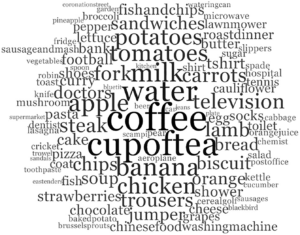It’s Think-It-Through-Thursday! Today I’m wrapping up this spring series that was intended to give you and your SLP colleagues some food for thought. Feel free to print and discuss at lunch or use for continuing education or journal review! Each blog post included a recent research article and some thoughts about how this relates (or doesn’t relate) to some of the practices we have in adult speech therapy!
Today’s topic: What Do People With Aphasia Want To Say?
*In case you missed the past few Think-It-Through-Thursdays, check out:
-Discourse + High-Level WAB Scores
-Personalizing Script Training for Aphasia
-Impairment vs Activity and Participation
Article Link: https://www.ncbi.nlm.nih.gov/pmc/articles/PMC5367780/ Palmer, R., Hughes, H., & Chater, T. (2017). What do people with aphasia want to be able to say? A content analysis of words identified as personally relevant by people with aphasia. PLOS ONE 12(3): e0174065.
 We know that in order to impact everyday language and functioning, we need to avoid workbooks as our main treatment for aphasia and instead use personally-relevant language with evidence-based treatments.
We know that in order to impact everyday language and functioning, we need to avoid workbooks as our main treatment for aphasia and instead use personally-relevant language with evidence-based treatments.
This study looked at 100 PWA and had them each identify 100 personally-relevant words they would want to say, then tried to categorize those words into overlapping categories. Some of my take-aways after reading the article:
*Only 27% of the words in this study fit in general categories. Whoa! A great statistic showing how important it is for us to personalize the language we use in speech therapy–what we practice is what someone can use, and everyone needs to use different language.
*They did find that across gender and age, the top 3 categories included food / drink, nature / gardening, and entertainment (social needs). My Home Sweet Home Series may be ahead of it’s time as it includes tons of practice to use personally-relevant language in the areas of Cooking / Meal Planning, and Gardening / Outdoor Tasks!

*Check out this visual representation of the most common overlapping words from the study! What strikes me is the cultural / region impact of the words (including words like Sausage and Mash, Fish and Chips, Coronation Street). Can you guess where this study took place? This shows how each of the cultures and regions we work within will have unique vocabulary needs as well, and we need to be ready and able to personalize our aphasia therapy to meet these needs.
Why do we need to personalize the language we practice in speech therapy? Personalization of therapy stimuli is necessary for TBI and aphasia! Using personally-relevant words and topics have been shown to improve a Person’s performance (perhaps because of higher motivation / interest, or relevance?). Personally-relevant words and topics also are directly in-line with the Life Participation Approach to Aphasia–the most efficient way to get there! Using personally-relevant words can maximize outcomes, real life results, patient satisfaction, etc. With most aphasia treatments, patients improve MOST with the words actually practiced (although we all wish generalization was less elusive).
So I “Tossed the Workbooks”, Now What? Toss them! Workbooks do not account for the unique vocabulary that we should be using with each person we treat. Instead, embed personally-relevant vocabulary within an evidence-based treatment for aphasia! I’ve done all the groundwork for you, including examples of personally-relevant vocabulary below! Each of these are evidence-based treatment methods used for aphasia:
Script Training for Aphasia Packet
Copy and Recall Training Packet
Response Elaboration Training Packet
Verb Network Strengthening Treatment Packet
Semantic Feature Analysis Packet
Conversation Partner Training Packet
Thanks for thinking it through! After reading the article, is there an aphasia therapy technique you are using that you could personalize instead of using generalized prompts?
Make sure you get the latest functional therapy updates: Follow Honeycomb Speech Therapy on Facebook , Pinterest, or Instagram, or sign up for email updates below.